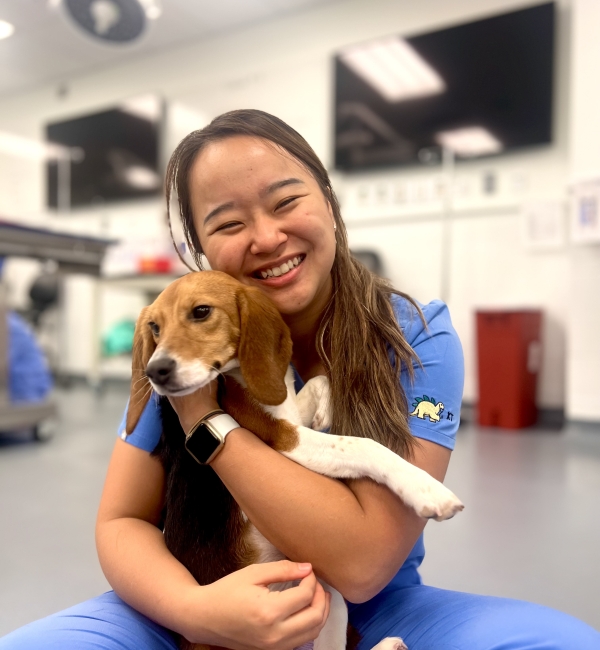Natalie, Class of 2026
When did you decide to pursue veterinary medicine?
Unlike most, I don't have a backstory where I declared an interest in veterinary medicine at a young age nor did I have a picture of me with a sign saying I wanted to be a Veterinarian when I grew up. I didn't know what I wanted to be, I just knew I liked Biology the most. I was introduced to the field of veterinary medicine 2 months before migrating over to the States for my undergraduate studies. I shadowed at a veterinary clinic out of curiosity about what went on behind the doors ... and the rest was history!
What did you do to prepare for veterinary school?
During my undergraduate days, I worked part-time at a veterinary hospital - this allowed me to draw connections between concepts I learned in class to patients at work. In the midst of all the hustle and bustle of going to classes, and studying to get good grades for a Bachelor's degree, it was so easy to get lost and lose focus of your purpose. Working at the veterinary hospital allowed me to stay grounded and a constant reminder for my "why vet med" while taking a break from studying. It also allowed me to practice having a healthy work-life balance, which has proven to be a life skill that carries on with me beyond my undergraduate studies.
In addition, my undergrad school did not have any Pre-Veterinary resources since there was not a huge demand for them, which led me to Founding the Pre-Veterinary Club on campus, providing a platform where like-minded students could share resources. This was a big step that helped me prepare for veterinary school as it allowed me to hone my leadership skills while forming meaningful relationships with local farms, veterinarians, and professors when looking for volunteer or educational opportunities for our club members!
What advice do you have for high school or college students who are interested in becoming a veterinarian?
Be a sponge! Go into your pre-requisite classes, extra-curricular activities or shadowing opportunities with an open mind and absorb everything that interests you or excites you! You'll come to find things that you like and also discover things that you don't. The best part is being able to immerse yourself in the experience without anything at stake, which is something I truly appreciated about being a pre-veterinary student in undergrad. The world is your oyster, step out of your comfort zone and enjoy the moments! You never know what will surprise you.
Why did you choose Cornell and what do you enjoy most about the veterinary program?
The push factor of Cornell for me was the huge emphasis on Problem-Based Learning (PBL), as well as the multitude of resources available to support students through our veterinary journey. PBL was one of the huge pull factors for me, as I liked how we are presented with "Cases" each week, in a format that mimics true cases we would see as a veterinarian, while fully incorporating lecture topics of that same week. I thought that this curriculum was very intentional and very well planned - it was going to be vital for my growth from a veterinary student to a future veterinarian. In addition, I was blown away and fully convinced of my choice during my in-person tour of Cornell Vet. From the floor-to-ceiling whiteboards to the amazingly equipped Modular Resource Center (MRC), I felt that Cornell truly takes their students' learning as a priority. Even though I had not started Veterinary School, I had already felt so supported and that was when I knew that Cornell was the one.



